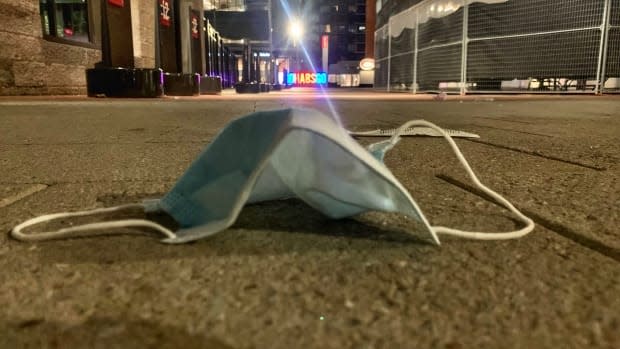Dancing around delta: Manitoba's decision to go unmasked

At one minute after midnight on Saturday, you're free to invite dozens or even hundreds of people into to your home — and every single one of them is allowed to shake their hips and wave their limbs in a rhythmic manner.
House parties of infinite size will soon be legal again in Manitoba, thanks to the further easing of the provincial public health order. So is dancing on private property, which was never banned during the pandemic, although it most certainly was way less fun when only you and your designated visitor were allowed to form the world's shortest and saddest conga line.
Dancing will remain illegal inside Manitoba restaurants of any size, at indoor weddings with hundreds of guests and at outdoor weddings with up to 1,500 people.
The new public health orders that kick in on Aug. 7 continue to ban public dancing in any form that does not involve a professional undulating in some manner on a stage.
It's almost as if Manitoba Public Health studied 18 months of pandemic literature and somehow concluded dancing was the primary means by which COVID-19 moves from one person to another.
This, of course, is silly. Everyone knows the primary mechanism for COVID transmission is the airborne movement of COVID-laced saliva droplets in indoor settings.
Everyone also know transmission of droplets can be reduced significantly indoors when people wear masks.
But while house parties of theoretically infinite size will soon be legal in this province and dancing in public places will remain as forbidden as it was in Footloose, the wearing of masks in indoor public places will no longer be mandatory.
This unexpected easing earned immediate scorn from some of the Manitoba physicians who have spent much of the pandemic trying and failing to convince the Progressive Conservative government to implement public health policies based on public health science.
Their general gist: Manitoba is doing away with one of its least restrictive and most effective means of preventing COVID-19 transmission before the more contagious delta variant becomes the dominant strain of the virus here and sparks a fourth wave of the disease.
"I am just so damn sick of how our society has to suck up the consequences of the incompetence of leaders who lack insight, empathy and humility, and the caution that is the hallmark of all those things," tweeted Dr. Jillian Horton, a general internist and author in Winnipeg.
"It doesn't make any sense," said Dr. Glen Drobot, who works in internal medicine at St. Boniface and Grace hospitals. "I fear we're going to be entering into a fourth wave that will be similar to the third wave."
Physicians elsewhere criticized Manitoba for downgrading mask-wearing from an order to a recommendation.
"The message is it must not be that important if you don't require it any more," said Toronto respirologist Dr. Samir Gupta, noting the United States lost control of the delta variant by eliminating mask mandates that some jurisdictions south of the border are attempting to put back in place.
Manitoba's chief provincial public health officer, who has acknowledged the next wave of COVID-19 will hit unvaccinated people the hardest, was asked repeatedly on Tuesday to explain the scientific rationale behind eliminating the indoor mask mandate.
He suggested current pandemic indicators make it safe to ease a number of restrictions.
"Certainly we might see the beginnings of a fourth wave in certain certain areas, potentially, around the world. But in Manitoba, although we're seeing an increasing proportion of cases of delta, we're seeing that in the face of declining case numbers and declining test positivity," Roussin said.
Premier Brian Pallister went as far as to suggest it doesn't matter what delta is doing elsewhere on the continent.
"Not every jurisdiction is, has got the same epidemiology, not every jurisdiction is in the same place. We're in a good place right now — and yahoo to that," Pallister said.

The problem is, Manitoba was the last of the six largest Canadian provinces to say goodbye to the third wave of COVID-19 and appears to be the last to usher in the fourth.
Roussin suggested it will be up to Manitobans to decide whether they ought to protect themselves and others with masks when that fourth wave finally arrives sometime this fall.
"Individuals are going to have to do some level of risk assessment for themselves as well on whether they want to wear masks indoors," he said.
There appears to be a lot of overlap between people who choose not to get vaccinated and people who choose not to wear masks. The people most at risk from the delta variant are the people least likely to mitigate those risks, Gupta said.
"The result of that is a whole bunch of unvaccinated people walking around unmasked as the delta variant appears, and unfortunately what that will do is accelerate the arrival and severity of that fourth wave," he said.
Manitoba is also removing some vaccination incentives on Saturday. Manitobans will no longer need to display a vaccination card in order to attend a movie or eat inside a restaurant with people from other households.
At least those restaurant-goers will remain protected from the torturous side-effects of tango, loss of life due to lambada and the potential for Harlem shake-induced hospitalization.

